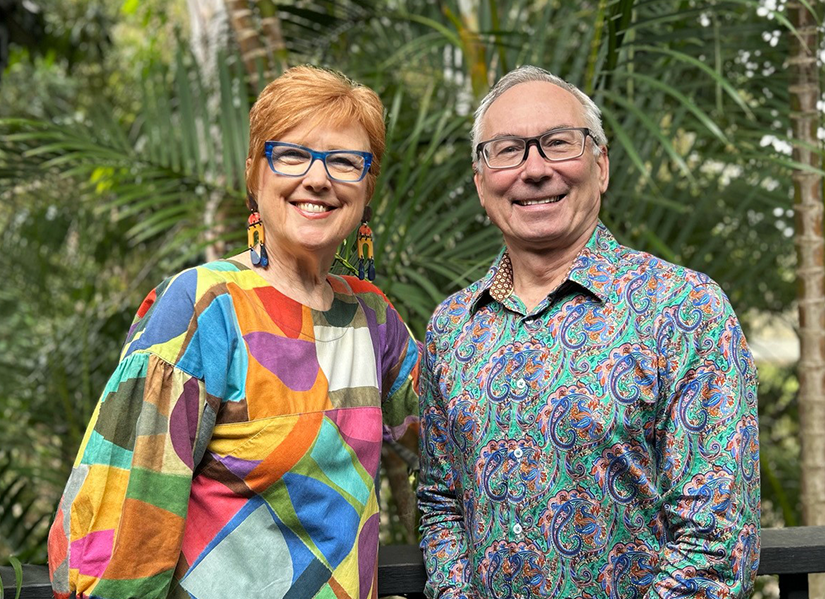
Victoria Aldred, 4 October, 2024
Julie and Maurice Hillier, the couple behind Ministry of Handmade, share how their passion for hands-on creativity led to the founding of their unique business. From workshops that teach skills like lampshade making to a commitment to sustainability and the circular economy, their journey is one of growth, adaptability, and the simple joy of creating something by hand. With plans to continue evolving and expanding their business, the Hilliers remain dedicated to empowering others to embrace the beauty and fulfillment of handmade crafts.
In this Q&A, the Hilliers reflect on their QUT beginnings, balancing life as business partners, and the vital role handmade skills play in an increasingly digital world.
What is Ministry of Handmade?
Ministry of Handmade is a unique business that values and recognises that working with our hands can be fun, uplifting and even therapy for the participant. Based in our home studios in Bridgeman Downs, we started out running small group workshops teaching a range of skills like sewing, upholstery and lampshade making. We also regularly invited nationally and internationally recognised artisans to deliver textile workshops in our studios. In addition, we have routinely “hit the road” to run workshops in far-flung locations like Cloncurry and Fremantle! In the last couple of years, we have expanded our lampshade offerings to include commercial lampshade-making and lighting design solutions.
What inspired you to start Ministry of Handmade, and how has it evolved since its beginnings in 2012?
How did your experience at QUT influence the creation of Ministry of Handmade?
As a married couple and business partners, how do you balance your personal and professional lives?
Julie: We met at QUT in first year and started our first business together at the age of 22. We have never really known not working together. It can have its ups and downs but open communication and respecting each other’s differences is always the key!
How do you see the future of handmade crafts in an increasingly digital world?
Julie: More important than ever. I believe we are hard-wired to make. You can’t just short-circuit tens of thousands of years of human history in the space of a century or two and outsource all the “making” to factory workers. For so long our lives (and identities and even names) revolved around what we made - the blacksmith, the cooper, the baker, the miller. Our very existence required that we could feed, house and clothe ourselves. You can’t wipe that away and retain the essence of being human.
What role do sustainability and the circular economy play in your business model, and why is it important to you?
Our world of fast fashion, single or limited-use products produces a massive waste of resources, energy and time. It is so short-sighted. We believe if people are invested in the things they make, the article becomes an extension of themselves, therefore its value is increased and it lasts longer. It is cherished. Handmade skills are essential in allowing people to invest in themselves and the things around them.
We prefer natural fibres and recycle wherever possible. We endorse this philosophy with our workshop participants and clients. Fabric offcuts are kept for use in smaller projects, we create our recycled packaging, and we have lots of solar panels, chickens and 20,000 litres of water storage.
Can you share a memorable moment from one of your workshops that highlights the joy of crafting?
Maurice: I have had a workshop participant tell me, 'You’ve changed my life.' She felt empowered that she had learnt a new skill that empowered her. The ripple effect of this on people’s lives cannot be underestimated!
In today’s fast-paced world, how do your workshops encourage people to slow down and be more present, and what impact does completing a project have on them?
You can only work at the speed of your hands - and you have to watch what you are doing. Distractions are reduced so you can focus on the task, and suddenly time disappears, and people are lost in another more satisfying world. It can be profound.
Looking ahead, what new skills or experiences are you excited to introduce through Ministry of Handmade, and how do you envision the future of your business?
We have never been a couple that likes to stand still. We view ourselves as nimble, flexible, and innovative. As a result, we are constantly on the lookout for ways to evolve our business, always intending to empower people to pursue the handmade processes. The silver lining of COVID was that it forced us to transition to online teaching. We set up our in-house video recording studio to create digital content. This has opened up global opportunities for us to share our skills, particularly lampshade-making and dressmaking. A fairly recent development has been the addition of the wholesale side of our lampshade business. Expanding this both in scale and scope is very exciting. We are already the largest wholesaler of lampshade-making supplies in Australia. We are also keen to develop our skills in the area of lighting design to allow us to offer even more creative solutions to our clients.
What is one skill that you couldn’t live without, and why?
Maurice: Puns. Enough said.
Julie: The ability to look at things from multiple points of view and see creative solutions. This valuable skill stops you from 'getting stuck.' As the years go by, we aim to 'not get old' in our ways and attitudes.
QUT degree - Bachelor of Applied Science - Built Environment (1978).
Do you want to learn more about Ministry of Handmade? Check out their website.
